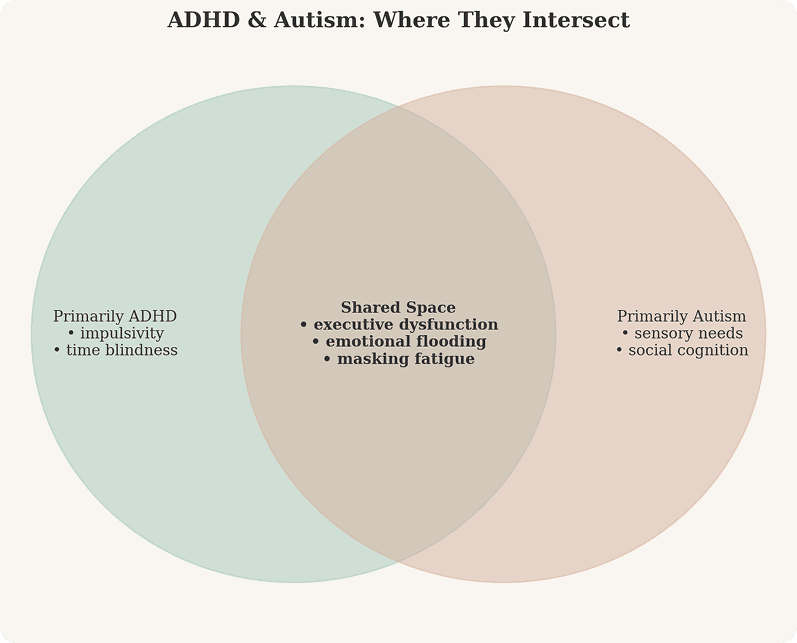Clarity on the overlaps, the real struggles—and what can actually help.
Many adults explore neurodivergence later in life, sometimes through an ADHD diagnosis, sometimes through recognising autistic traits.
For some, this discovery is relieving. For others, it raises more questions than answers.
As a psychodynamic, attachment-based therapist, I hold space for both the realities of neurodivergent wiring and the relational/emotional patterns that often come with it, especially for those who grew up misunderstood, masked their inner world, or adapted to environments that didn’t see them clearly.

ADHD and autism are distinct diagnoses—but in real life, they often coexist or overlap. Research suggests that up to 80% of autistic adults also meet criteria for ADHD. Many adults navigate challenges with executive function, sensory sensitivity, or social overwhelm that feel true to both spectrums.
For many—especially those with internalised coping styles—these differences have meant years of adapting, masking, or even blaming themselves.
What looks like distraction, shutdown, or “underperformance” is often the result of deeper realities such as:
A nervous system stuck in chronic stress
Unprocessed trauma or attachment injuries
The exhausting effort of blending in
Years of unmet needs or internalized shame
You’re not making excuses. You’re making sense of yourself. And that matters
Rather than seeing ADHD or autism as fixed “deficits,” I approach them as deeply interwoven with your life story—including how you learned to relate, self-regulate, and survive in the world.
If this resonates, we can explore it together
Insight matters, but sometimes you also need concrete tools. My integrative approach blends adhd therapy with practical coaching, so emotional growth can translate into everyday change.
Planning with less stress prioritising and organising tasks
Managing overwhelm, navigating sensory or emotional intensity
Following through completing goals without burning out
Creating systems that work with your energy, not against it.
ADHD and autism are real neurotypes. For many, receiving a diagnosis can feel deeply affirming as it brings clarity to lifelong patterns that once felt confusing or even shameful.
But diagnosis is also personal. For some, the process can feel invasive, pathologising, or simply unnecessary. A label is not the only way to understand yourself; you don’t need one to begin this work. Whether you’re diagnosed, self-identifying, or just exploring, your experience matters.
We live in a culture that rewards speed, output, and conformity. For sensitive and divergent minds, this often leads to misdiagnosis or feeling chronically “wrong.” Therapy can be a place where complexity is honoured, not just pathologised.
For some people, psychiatric medication can be a helpful way to manage executive difficulties or nervous system overwhelm. If it feels relevant, we can discuss what sort of options are available and consider involving a psychiatrist in your treatment.
Whether you’ve been diagnosed with ADHD or autism, wonder if you might be on the spectrum, or simply feel your mind works differently, therapy for adhd or asd can offer a deeper exploration of yourself. You don’t have to figure it out alone.